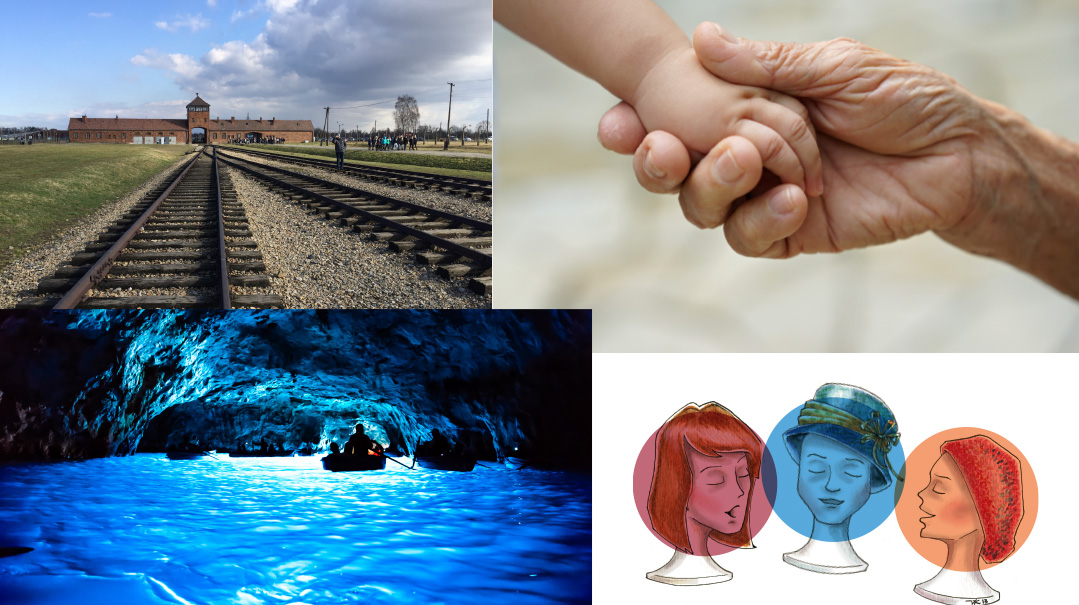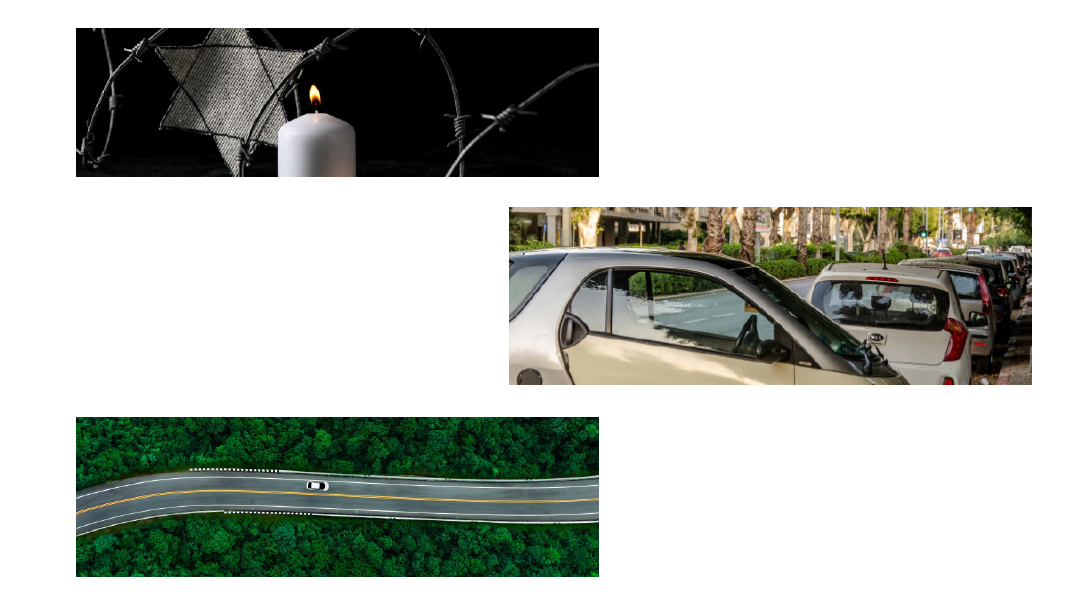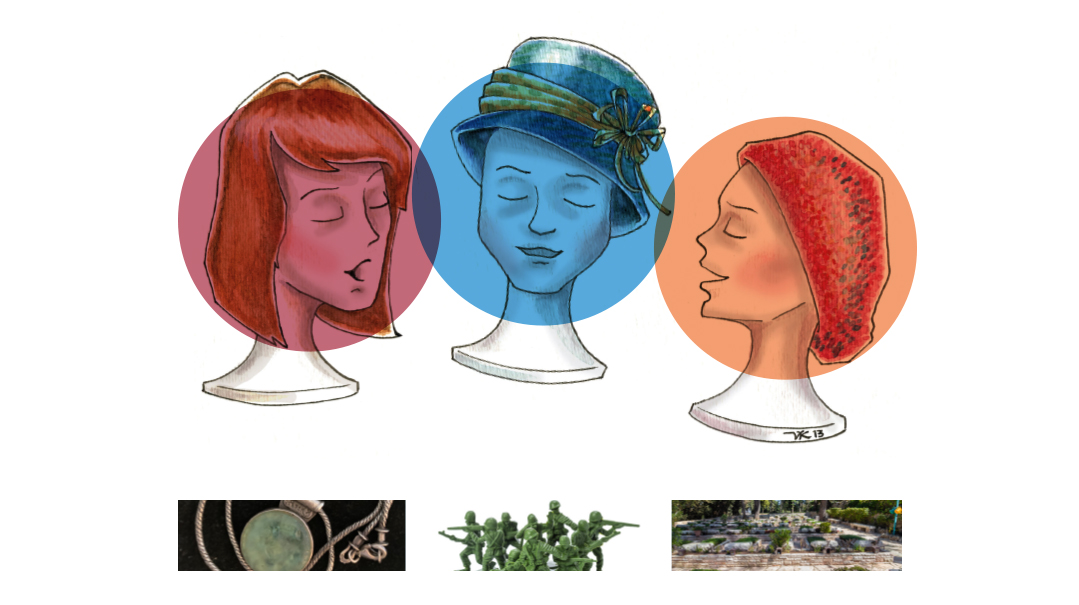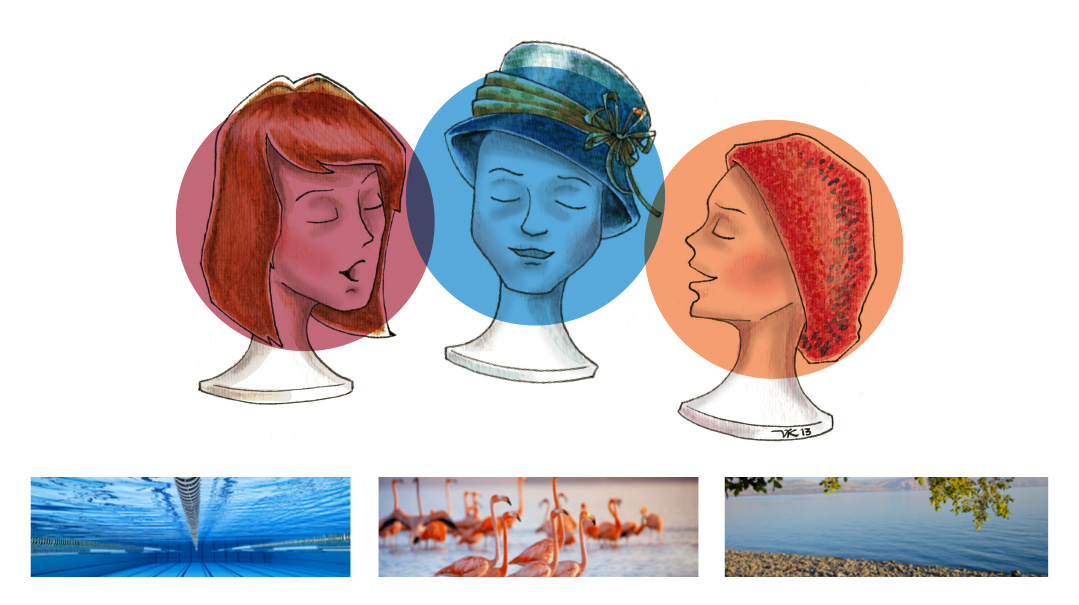Divine Schmoozing
| December 2, 2020We learned from our parents that wherever a Jew is, it’s always a good place to talk to our Father
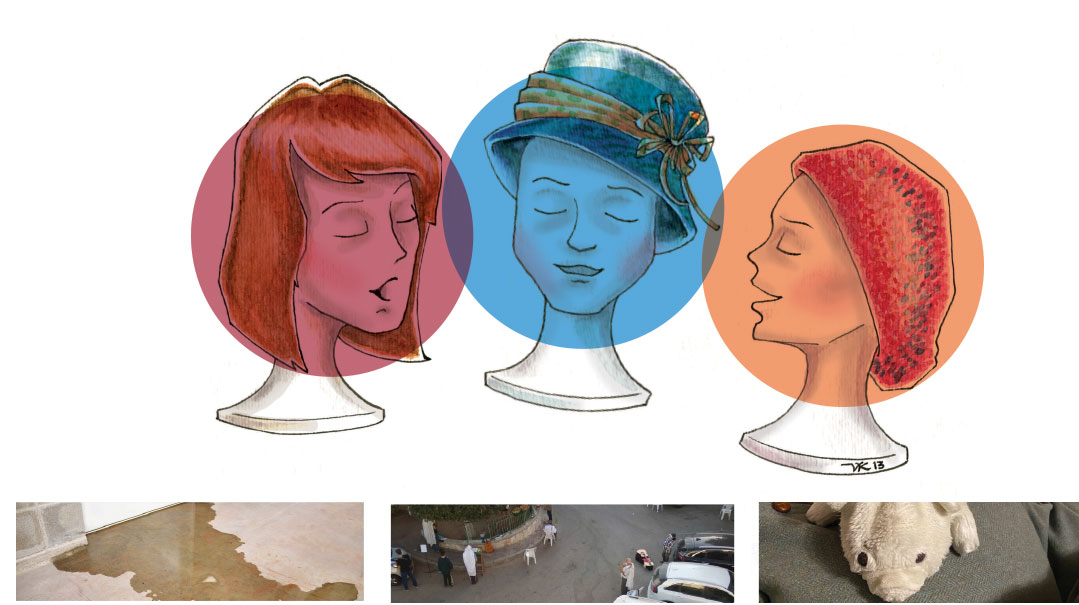
We Sisters inherit our love for tefillah from both sides of the family.
An elderly woman who knew our father a”h as a young man, long before we were born, told us: “Nathan? All Nathan wanted to do was sit in his synagogue and pray. A shul Yid.”
Our mother a”h had a different tefillah style. Living in Eretz Yisrael in her last decades, her favorite place was Yam Hamelach. Floating in those wondrous salt waters, surrounded by the mystical mountains where David Hamelech sought shelter and perhaps wrote chapters of Tehillim, renewed her, body and soul. That was the place, she told us, where she spoke most honestly and fervently to Hashem.
Come join us Sisters as we share some of our own informal conversations with Hashem. Crying out at a moment of high stress, then thanking Him in a moment of calm. Touching the timeworn stones of the Kosel. Looking down at a Beit Shemesh street — and up to Hashem’s beautiful skies.
Because what we learned from our parents is that wherever a Jew is, it’s always a good place to talk to our Father.
Marcia talks with Hashem when she’s…
Melting Down
Ribbono Shel Olam, why are you doing this to me!!!
After seven months of barely venturing into a supermarket, the thought of passing through germ-laden airports and boarding a flying virus factory was somewhat unnerving. Still, I conquered my fears and decided to head for Florida to spend the Yamim Noraim with my kids.
As it happened, I didn’t have time for fears. I was too busy coping with a series of unfortunate events.
Thursday night before the flight. The Washington area was inundated with a mabul that overflowed roadway bridges, swept up cars in flash floods, saturated the ground… and sent water gushing into my basement. My night was spent squeegee-ing water out the back door.
Friday. In between packing, teleworking, and preparing for Shabbos, I kept toweling water that was seeping up between my recently installed floor planks. I set up a fan to help the drying process, laid out more towels, and resolved to have a peaceful Shabbos without venturing downstairs.
Sunday. The seepage was slowing, but the fan wasn’t doing the trick. My new flooring was supposedly waterproof, but I shuddered at what might be happening underneath. So I borrowed a huge blower to speed the drying. Crisis averted. But then…
An upsetting phone call: A friend tested positive for COVID-19. I might have been exposed. Most of the day was spent calling rabbis, doctors, and my kids to determine if I’d actually been exposed... finding out where to get tested quickly... wondering if I’d have to cancel the trip and spend Yom Tov sick and alone... finally getting the rapid test result call. Baruch Hashem: negative. Second crisis averted.
Monday morning, an hour before leaving. I prepared lunch and supper for the trip and was about to resume final packing. I peeked downstairs for one last check...
Crisis number three: more water on the floor! But not from below — from above! So I…
- Placed pans to catch the drips
- Called around till I found someone who could turn off the house’s water (memo to me: learn how to do that myself!)
- Started shlepping luggage to my car
- Bent a thumbnail back while hefting a suitcase into the trunk, causing blood to spatter all over my white traveling shirt
- Decided to call my daughter, who was supposed to drive me to the airport in my car, to tell her I’d be late
- Reached for my phone, but it was in my shirt pocket — whose zipper was stuck
- Decided to just finish loading and drive to my daughter. Time to grab my food bag. With trunk still open, and luggage littering my lawn, I ran back into the house… and couldn’t find the bag.
That’s when I lost it. I wailed to Hashem,
Ribbono Shel Olam, why are you doing this to me!!!
Tuesday morning. Sipping coffee on the screened-in porch of a Florida condo close to my kids’ house, I feel the stress melting away. No raging floodwater here. Just tranquil lake water amid lush greenery and tropical blue sky.
Suddenly everything becomes clear. I start another conversation with Hashem.
Ribbono Shel Olam, thank you for your impeccable timing.
Had flood number two occurred an hour after my leaving, rather than an hour before — I’d have no house to return to!
Had I decided to stay home for the Yamim Noraim — with no plumbers available days before Rosh Hashanah — I’d have been forced to flee my waterless house.
The thoughts continue with a memory — a remark made by our mother, a”h, when she encountered plumbing issues. “I don’t understand it,” she said. “After everything I went through in the Holocaust, why do I get so aggravated about leaking pipes?”
So what’s the message here? Is Hashem telling me it’s okay to occasionally melt down? As long as we eventually “melt up” by putting our problems into perspective? Also… is He reminding me to show some gratitude? And that it’s okay to make requests? Big and small?
Okay, then…
Thank you, Ribbono Shel Olam, for keeping my family and me safe and healthy. Please keep it so.
And as long as I’m making requests… When I return from my trip and open the door to my house — can you please make sure everything’s dry?
Miriam shares stories of…
Three Kosel Conversations
Yes, you can — should — talk to Hashem anywhere. In your car. In a doctor’s waiting room. When putting your little one on a school bus, holding your first grandchild, or hoping that the rib roast will come out tender this time.
But for me, the very best place to converse with Hashem is at the Wall. The Kosel.
In the more than three decades I’ve been zocheh to live in Yerushalayim, I’ve said many words there, and I’ve heard others say many more. From a stuffed animal, to a shidduch, to a broken heart — here are three true Kosel conversations, the kind of informal and heartfelt “convos” that Hashem, in His infinite chesed, allows, no, encourages, His mortal children to have with Him.
Little Josh loved Snuggle. Needed him too. For without his stuffed toy Snuggle, four-year-old Josh would simply not go to sleep. Ever.
Josh’s parents — my husband’s relatives, who told us the tale — needed Snuggle too, if they wanted to enjoy a decent night’s sleep. That’s why they were so careful, when traveling in Israel, to ensure that Snuggle wouldn’t get lost. The house rule: Snuggle stays safely in their hotel while the family enjoys touring the land.
Problem was that Housekeeping in their Haifa hotel didn’t realize they had a stuffed-VIP staying with them. Somehow, in the confusion of packing up and checking out of that hotel — Snuggle disappeared.
Josh’s parents realized almost immediately that Snuggle had gone missing, and as the family drove to Yerushalayim, next stop on their itinerary, the phone calls between them and the hotel in Haifa went back and forth.
“Find Snuggle and send him back to us!” was the clarion call.
They arrived at their hotel in the holy city , alas, Snuggle-less, and immediately went to the Kosel. As they were leaving the holy site, Josh confided to his parents, “I prayed and prayed that we should find Snuggle.”
And when they arrived at the hotel, there he was, awaiting them, in all his droopy glory.
And Josh knew his prayers had been answered.
My close friend Huvy’s whispered request took a little longer to be fulfilled.
Huvy was a single mom, and she’d begun dating again. We decided that together we’d daven at the Kosel for 40 days. It was a recognized and much-beloved segulah, but not simple for two working mothers with several little kids between them. Somehow, with the help of my husband, babysitters, and a fine dose of siyata d’Shmaya, we managed.
On the 40th day, we decided to say the entire Sefer Tehilim. The rain — so welcome in Eretz Yisrael, but oh, so cold and wet — was coming down, and in those days before Kotel Tunnels and the indoor ezras nashim, there was little shelter. But we managed, a bit waterlogged but very happy.
And after 40 days of prayer and two months of dating, Huvy met the man who would become her husband.
And Huvy knew her prayers had been answered.
And now, for the hard part.
It was one of the nights of Chanukah when we received the kind of news everyone dreads. It was from my father-in-law, a”h. Through a haze of shock, we heard the words. Cancer. Metastasis. Vital organs. End-stage.
In the joyous glow of our Chanukah licht, the world had turned upside down.
First step: Book tickets for my husband on the next available flight.
Second step: Jump into the car and speed to the Kosel.
Third step: Daven, say words of prayer laced with fear, sadness, and shock.
And then — this is more than two decades ago, and yet I remember every emotion with an astonishing clarity — I felt the world right itself again. Hashem was in charge. He knows what He’s doing.
Seven months later, my father-in-law passed away.
A happy ending? Certainly not classic fairy tale. No huggable animal at the end, no joyous chuppah. And yet… as we spoke before those stones, which had heard millions of words of prayer before, and yet still welcomed ours, there was solace. Those whispered words reminded us that Someone was listening. And there was purpose to suffering and meaning in pain.
Because when you speak to Hashem there is profound comfort and inescapable joy.
And even if the answer is “no,” no prayer goes unheard. Or unanswered.
Emmy Leah composes…
A Rooftop Letter to Hashem
Dear Hashem,
I’m writing to You from my Beit Shemesh rooftop mirpeset, overlooking our street minyan. Looking down from my one-woman ezras nashim, I see the cheerful red “gazebo” on my neighbor’s porch, a tent-like structure with a cloth roof and no walls. It shelters the tallis-draped plastic table that’s our bimah, and gives the opening words of our prayers, “mah tovu ohalechah Yaakov,” new meaning.
Watching tallis-clad men standing socially distanced on the street below, I remember the same street, then unpaved, 26 years ago. The small group of religious Ashkenazim who built homes here dreamed of building a proper shul instead of the bomb shelter where we first davened to You.
On this same street, our children sold lemonade and homemade Succos decorations and arranged Purim carnivals, as a dozen families raised money and miraculously managed to build a beautiful shul building.
The building that today is locked down and locked up.
Forget memories of a long-ago past. Let’s return to Purim this year.
The words Wuhan and pandemic were beginning to enter the lexicon. Masks were still just parts of Purim costumes. Following government instructions, bottles of alcohol cleanser were placed around the shul. After leining Megillah, my husband grabbed the plastic bottles and danced with them around the bimah, laughing.
Two weeks later, we weren’t dancing anymore. Or laughing.
It took 14 years from the time we moved into our newly-built homes to build our shul building.
It took two days from the morning that my husband returned from the closed shul, tallis and tefillin in his hands and tears in his eyes, to organize our street minyan.
Five top reasons not to daven on a roof overlooking an outdoor corona street minyan:
- Quiet chazzanim competing with the noisy hum of nearby air conditioning units.
- Louder chazzanim competing with delivery trucks’ idling diesel engines, honking taxis stuck behind those delivery trucks, motorcycles vrooming and cars backfiring on nearby streets, and drilling from endless construction.
- Annoying birds flying above dropping feathers, occasional tiny eggs, and one dead baby bird on my roof.
- Dogs barking, especially when they hear the shofar blown every morning in Elul.
- The day the smelly garbage truck came early and the chazzan had to wait for the trash to be picked up before finishing Shemoneh Esreh.
Five top reasons to daven at an outdoor corona minyan:
- Obviously… avoiding corona.
- Extra kavanah when hearing an ambulance siren while saying Refaainu or Mi Shebeirach for cholim.
- A happier sound: listening to the same birds who messed up the rooftop chirping. Especially on Friday nights, as the sun goes down, the birds’ sweet songs sound like a choir singing Your praises along with the chazzan.
- Sunset on Friday nights. The moon rising at Maariv. Magnificent clouds, pink and white against the blue sky. Many tefillos praise the beauty of Your natural world. Seeing it as one says them brings those words to life.
- No need for a Mizrach sign when one can see Harei Yehudah, the mountains Dovid Hamelech sang about. These mountains surround Yerushalayim, as Your Presence surrounds Your people.
Hey, there’s more than five reasons! Continuing….
6. My mural. Realizing our minyan might continue a while, my grandchildren decided to decorate the roof. They scraped old paint from the walls, spackled crumbling concrete, and painted a picture of those glorious mountains, giving me a reminder to thank You for my beautiful family as well as Your beautiful world.
7. Many parshiyos describe Eretz Yisrael, its beauty, its kedushah, Your Hashgachah pratis. I listen to the holy words — and see Your beautiful land.
There’s more, but I’ll end with…
8. My husband’s Kaddish list. When word got out about our three-times-a-day minyan, people from all over the world who couldn’t get to shul asked my husband to say Kaddish. Twenty neshamos remembered three times a day on a street in Eretz Yisrael.
Hashem, I have to end this letter… word count, You know. I’ll finish with a prayer for an end to the pandemic and Your people’s tzaar.
And one more prayer: When it’s over, I pray that I’ll take all I’ve felt and seen and heard and learned on the roof with me from my rooftop back to my comfortable, beautiful shul.
Let’s stay in touch. Always.
Emmy Leah
(Originally featured in Family First, Issue 720)
Oops! We could not locate your form.


